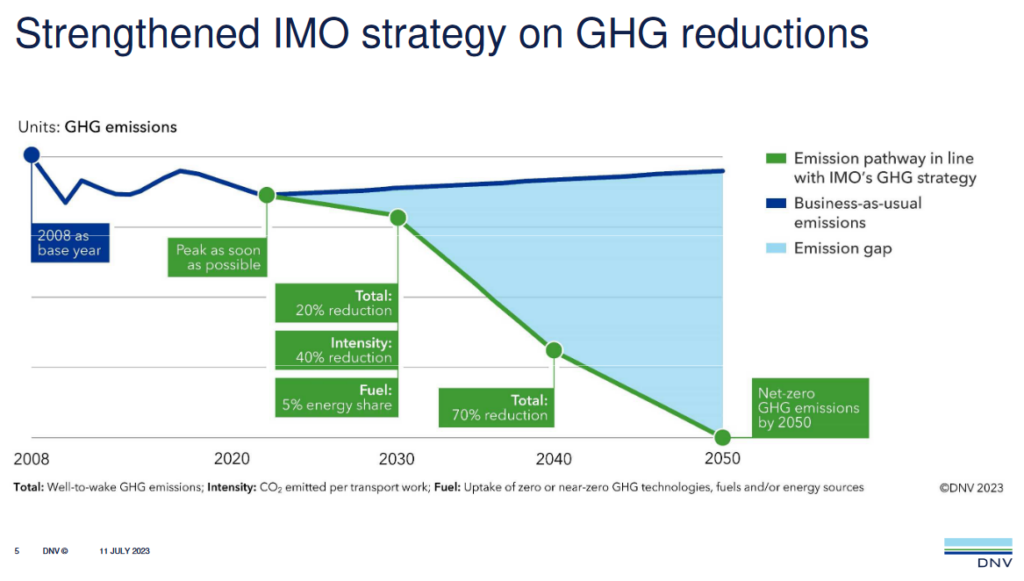The IMO charts a course to net-zero
By Julian Atchison on July 18, 2023
Historic roadmap, milestones agreed to by member states

Last week at the eightieth meeting of the Maritime Environmental Protection Committee, the member states of the International Maritime Organisation agreed to a new, stepwise roadmap for the decarbonisation of the global shipping sector. By 2030, the total greenhouse gas emissions of global shipping must be at least 20% lower than the 2008 baseline level, accelerating to an at least 70% decrease by 2040, followed by net-zero emissions in 2050. This represents a significant step-up in ambition from the initial IMO decarbonisation strategy agreed to in 2018. Work will now proceed developing the critical regulatory packages to help realise this goal – particularly an emissions pricing mechanism, technical standards, financial support for small island states & least-developed countries, as well as fuel certification.
The adoption of the 2023 IMO Greenhouse Gas Strategy is a monumental development for IMO and opens a new chapter towards maritime decarbonization. At the same time, it is not the end goal, it is in many ways a starting point for the work that needs to intensify even more over the years and decades ahead of us. However, with the Revised Strategy that you have now agreed on, we have a clear direction, a common vision, and ambitious targets to guide us to deliver what the world expects from us.
IMO Secretary-General Kitack Lim in his organisation’s official press release, 7 July 2023
Well-to-wake is the path forward
The well-to-wake approach will be the basis for lifecycle analysis of maritime fuels going forward, and will underpin the development of mid-term emissions reduction policy at the IMO. This outcome follows on from discussions at a lead-up event to the MEPC in London – the fifteenth Intersessional Working Group on Reduction of GHG Emissions from Ships. The AEA collaborated with the International Bunker Industry Association, the Methanol Institute and the European Biodiesels Board on a submission & presentation at this lead-up event. The main message delivered in this joint submission was that alternative maritime fuels can be produced in sufficient quantities, but only if investor confidence is motivated by policy which will deliver clear demand signals. The strengthened ambitions and adoption of a well-to-wake methodology will support such confidence.
The role of alternative fuels
3.3 Levels of ambition directing the 2023 IMO GHG Strategy are as follows:
• …uptake of zero or near-zero GHG emission technologies, fuels and/or energy sources to increase
• uptake of zero or near-zero GHG emission technologies, fuels and/or energy sources to represent at least 5%, striving for 10%, of the energy used by international shipping by 2030…
From 2023 IMO STRATEGY ON REDUCTION OF GHG EMISSIONS FROM SHIPS, adopted on 7 July 2023
For the first time at the IMO, the uptake of low or zero-carbon fuels is included in its decarbonisation strategy. The 5 – 10% by 2030 milestone is seen by shipping consultancy UMAS as a “key enabler of early investment” into alternative fuel technologies, supply chains and infrastructure that should be “ready for their rapid scaling from 2030”.
Next steps, and what does this mean for your organisation?
In upcoming MEPC meetings, a suite of mid-term regulatory measures to support this decarbonisation strategy will be finalised. In 2025, these measures will have been adopted by the member states, and then enter into force across the global shipping sector by 2027. In five year’s time (2028), a review of this decarbonisation strategy will take place, no doubt lifting ambitions even further.
For more insight into what these decisions mean for your organisation, options include:
- UMAS’ detailed analysis report on the outcomes of MEPC 80
- a webinar discussion between key shipping stakeholders presented by the Global Maritime Forum
- and DNV’s webinar analysis of all the KEY decisions made at MEPC 80 (register via the link to access the recording)